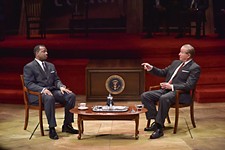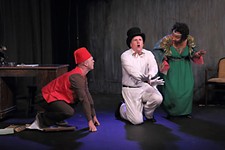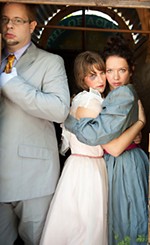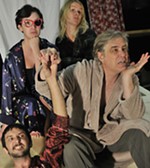Heartbreak House
Local Arts Reviews
Reviewed by Barry Pineo, Fri., March 7, 2003
Heartbreak House: Chatting in a Garden as Bombs Rain Down
Lab Theatre, UT campus, through March 8Running Time: 2 hrs, 30 min
After September 11, the media flapped about the change that American culture would undergo, that the superficial and facile would disappear and that a new seriousness, empathy, and sense of care and community would transform the American personality. Now, less than two years later, we face the monoliths of Joe Millionaire and Anna Nicole Smith.
Surely George Bernard Shaw couldn't have seen this coming. Shaw was an Irish dramatist writing at the beginning of the last century about a world very different from this one -- or was it? From the introduction to Shaw's play: "Heartbreak House is not merely the name of the play. It is cultured, leisured Europe before the war. The nice did not wish to realize Utopia for the common people: They wished to realize their favorite fictions and poems in their own lives; and, when they could, they lived without scruple on incomes which they did nothing to earn." Not exactly reality TV, but little doubt that Shaw was prescient. Perhaps every war is exactly like every other war, and soulless people will always be exactly that.
Calling this a war play, however, would be unfair, for war is merely the background for the love games of Shaw's wealthy, seemingly comfortable characters. The first two acts take place in the home of Captain Shotover, an aged seaman with two daughters, one who married for love, the other for money, and neither of whom is satisfied. Other assorted privileged types weave in and out, all seeming to have little to do but joust over love and politics and, well, mostly love. Over the course of a single evening, we watch them play each other like cards, until all end talking in a garden as bombs rain out of the sky.
Should you attend this UT Department of Theatre and Dance production, you'll have to work. In one sense, that's a good thing, as director Lee Abraham uses this show to fulfill his department's mission as a training ground for young actors. The casting is nontraditional; almost without exception, none of the actors are appropriate for their roles in terms of age or type, so more than the usual amount of concentration is required on the audience's part. Abraham has the actors compensate for this nontraditional style in various ways, and when it pays off, it pays off well. Enrique Bravo, with his muttonchops, bushy moustache, paunchy padded body, and stooped but dignified gait, totally embodies a man considerably older than himself. Mickey Killianey, not quite as effective as Bravo, but like Bravo assisted by extensive make-up and costume effects, manages to convince as the ancient captain. Abraham also is blessed by his designers, particularly J. Richard Smith, whose set uses minimal pieces to create both a convincing, earth-toned drawing room and the garden behind it, and Matthew Hemesath, who contributes the turn-of-the-century costumes.
In another sense, having to work at enjoying a play can be detrimental. Shaw can be wordy, and the actors here blast through the first plot-laden act as if escaping something fraught with danger. The tempo slows somewhat for the second two acts, but if Shaw is attempted, some definite way of dealing with all that plot-heavy text should be first on anyone's list. Certainly, there's little question that Shaw should be attempted -- after all, he could see it all coming.










